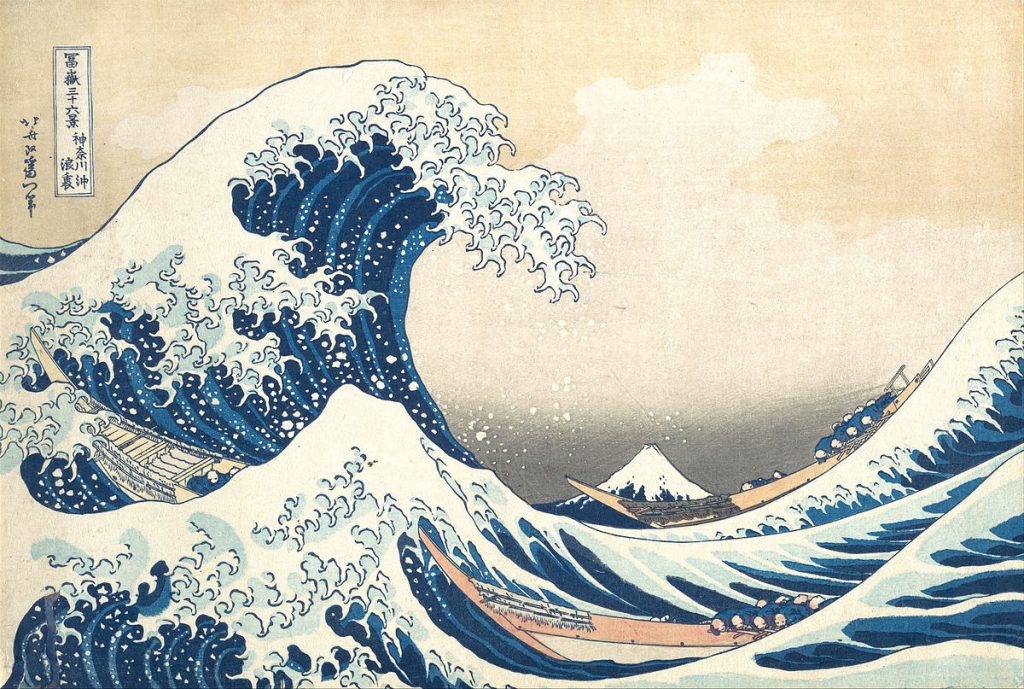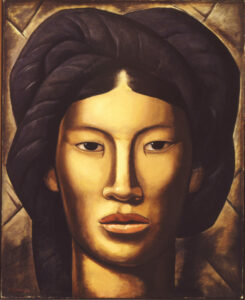What do you suppose would happen if Buddhism were to be brought to China, and then introduced to the samurai warriors of Japan? If you answered that Zen Buddhism would be created, then you’re correct. The Chinese, especially the Taoists, were intrigued by Buddhism’s profound philosophy, dialects, analyses, and speculations. However, Buddhism’s advocacy of a homeless life, world-fleeing, and life-denying tendencies did not mesh with the Chinese people’s worldly and practical centered lives.

Keeping with Buddhism’s made idea of achieving Nirvana, Zen focuses on achieving Satori (さとり) (enlightenment). Instead of focusing on escaping the cycle of rebirth, Zen focuses on finding meaning in everyday activities such as eating, working, and business etc. The meaning revealed to us is in being itself, or isness, often referred to in Japanese as kono-mama (この-まま) or sono-mama (この-まま). Another characteristic of Zen is that is does not deal with the abstract. A Zen-man will have no need for instruments of other media to express his art. Instead, upon achieving Satori (さとり), a Zen-man will become privy to a world of wonders and miracles 1, and his art will be expressed through the transformation of his life into a world of creation.2 Ultimately, a person will not escape the cycle of rebirth. Rather, they continue to be reborn so that they may help others achieve Satori (さとり) through Zen. The Chinese developed Zen as a form of Buddhism that focused more heavily on the physical and living world rather than a different one.
This explains how Zen came about but, how did it make its way to Japan? Japan and China had a big brother little brother relationship. China was the larger and more powerful country with a plethora of resources at its disposal, whereas Japan was an island nation that had limited resources available to itself. Because of this, Japan frequently traded goods and ideas with China. Through continuous trade, Japan would adopt many of China’s farming practices, its calendar system, and their written language, also known as Kanji. Even the Japanese government would import laws and other ideas from the Chinese government, even going so far as to send students and government officials to study from Chinese officials. Over time, Japan’s culture would become very similar to China’s own, by becoming much more focused on the living world rather than the afterlife. It was through this trade relationship that the twelfth-century Buddhist priest Eisai journeyed to China. Upon his return, Eisai brought with him Buddhism’s newest school of thought to Japan and began introducing Zen to the Kyoto area.3

However, Zen was not the first form of Buddhism introduced to Japan. While there is some debate over the exact time when Buddhism was first introduced to Japan, the most commonly agreed upon time frame is 500 to 550 C.E. Because the older schools of Buddhism were already well established in the Kyoto region, Zen struggled to gain popularity. Eisai was forced to take a conciliatory stance in relation to the older schools of Buddhism, and diplomatically garnered favor with the Imperial Court. After his peaceful attempts to spread Zen were met with violence, Eisai traveled back to the Kamakura region, home of the Hojo government (1200-1330). It was here in the Hojo government that Eisai was able to spread Zen to a wider audience.4
The Hojo Government was known for being a militaristic regime.5 The most well-known member of the Hojo family was Hojo Tokimune. Tokimune is widely considered one of Japan’s greatest historical figures for his successful quelling of the Mongol invasions. Tokimune was only thirty-two at the time of his death, but in his short life, Tokimune dedicated himself to the study of Zen and erected temples for the Chinese Zen masters in Japan. Due to his revered status and position in the Hojo regime, many of the lower ranking generals and samurai adopted Zen both as a way to honor their fallen leader and because living a Zen life was thought to be the way a samurai should live his life.

Zen has its strongest connection to the samurai through the famous Bushido Code, also known as the way of the warrior, which is the code samurai live their lives by. A samurai that follows the Bushido Code values loyalty, filial piety, and kindness above all else. However, to live this life, a samurai must clear his mind of all other distractions, including the fear of death. To be an infallible guardian that their masters expected them to be, a samurai had to only concern himself with living, or isness, and in doing so would find Zen and achieve Satori (さとり). For a samurai, living by the Bushido Code and being their master’s almighty guardian was best achieved through living a Zen life and achieving Satori (さとり). Funny how it was the blending of an Indian religion with Chinese ideas that helped the Japanese samurai live a life more in line with their warrior code.
- Ichirou Ishida and Delmer Brown, “Zen Buddhism and Muromachi Art, The Journal of Asian Studies, Vol. 22, No. 4 (Aug., 1963): 419 ↵
- Wm. Theodore de Bary, Donald Keene, George Tanabe, and Paul Varley, Sources of Japanese Tradition 2nd ed., vol. 1 (New York: Columbia University Press, 2001), 321-324. ↵
- Encyclopedia of Religion, 2005, s.v, “Buddhism: Buddhism In Japan,” by Brian O. Ruppert ↵
- E. Dale Saunders, Buddhism in Japan With an Outline of Its Origins in India (Great Britain, India, Pakistan: Oxford University Press London, Bombay, and Karachi, 1964), 94. ↵
- Daisetz T. Suzuki, Zen and Japanese Culture (New York: Pantheon Books Inc., 1960), 62. ↵



39 comments
Thomas Fraire
I genuinely had no understanding of how Buddhism functions or what it was precisely until the point when I read this article. I discover this religion most intriguing in light of the fact that there isn’t really a God, however, it more spins around about peace. I observe the idea of Zen to be most intriguing and how knowing your actual self could enable a man to reach to their internal identity of peace and dependence. Moreover, I thought this article was an extraordinary awakening to how religion can be numerous things and diverse ideas.
Alexandra Lopez
Buddhism is a religion that my previous teachers have touched lightly upon. I had never known the actual importance, significance and meaning of what this religion practiced. Reading about it was fairly interesting. Along with the factual texts, the translation to their language was very informative. I find that very helpful and enjoyable. I also found the in-depth detail about Zen. I had only related the word Zen with relaxation but never knew the entirety behind the term. Again, extremely informative article.
Esperanza Mauricio
This gives a good understanding to how religion can shape a mentality. The way of the samurai was a very special mindset that cared a lot of pride to their way of life. There was a lot of resistance to the end of the samurai and after some fighting within the country occurred. The way of the samurai was valued so much that some fought to keep their way of life. Sadly their caused died and the class was later abolish.
Maria Esquivel
I have heard of Buddhism but never knew much of it or that there are different types of it. I found it quite interesting learning a little about the significance of Buddhism and the way it made its way to Japan. Overall, I think the meaning of Satori is beautiful, and the article provided many details of this type of religion. I really enjoyed reading it!
Auroara-Juhl Nikkels
Buddhism is one of my favorite religions to learn about. I knew there were branches of Buddhism, but I did not know what they were or about them. Your article was very informative and easy to follow. I did not know how Zen spread to Japan, I did not know that it was even in Japan or that the samurais practiced it.
Constancia Tijerina
I honestly had no concept of how Buddhism works or what it was exactly until I read this article. I find this religion most interesting because there isn’t necessarily a God but it more revolves around about peace. I find the concept of Zen to be most interesting and how knowing your true self could help a person reach to their inner self of peace and reliance. Furthermore, I thought this article was a great eye opener to how religion can be many things and different concepts.
Caroline Bush
Great article! Even though I was raised in a catholic environment I have always found Buddhism interesting. I liked how this article went into the detail about how Zen made its way to Japan, which is something I’ve always wondered about but never knew. I also never realized that the samurai of Japan had adopted Buddhism, which is something really interesting to know. Overall I really enjoyed reading this article and loved the amount of detail and history put into it.
Arianna Kennet
I come from a country where Buddhism is one of the religions, so I know a little bit about it. I like the meaning of Zen, as it has something deep behind the word. It asks us to find meaning in everything in life, and I think that is beautiful. It is interesting how they believe in the concept of rebirth too.
Carlos Vazquez
Buddhism is an extremely interesting religion. Although it is not as big as other religious with only half a billion followers, it is still one of the most important in the history of Asia. Before reading this article, I had no idea there was different types of Buddhism and that the famous samurais of Japan were Zen Buddhist. This article is very well written and informative.
Noah Laing
I found this article to be very interesting to me because I’ve always been curious to see how different religions practice their beliefs. After reading this article, I’d say that Buddhist seem to be peaceful people and are not consumed in materials very easily, which draws a great contrast to the materialistic society that makes up America.